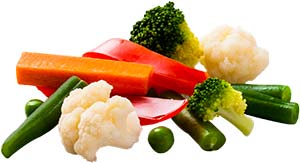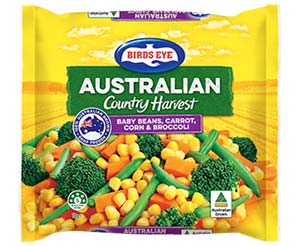Jennifer Arguelles, accredited practicing dietitian at Simplot Australia, addresses the so-called fresh vs. frozen vs. canned vegetables question in a feature report uploaded at the company’s website on December 7. Her post is a digest of an article she penned for the current issue of Food Australia, a publication issued by the Australian Institute of Food Science & Technology (AIFST).
 Noting that research on the nutritional differences is sometimes conflicting, and that there is inconsistency in methodologies and reported results, she points out that there are many variables that affect nutrient retention. Among them are season, cultivar, time of harvest, time in storage before or after processing, the processing method and the cooking method.
Noting that research on the nutritional differences is sometimes conflicting, and that there is inconsistency in methodologies and reported results, she points out that there are many variables that affect nutrient retention. Among them are season, cultivar, time of harvest, time in storage before or after processing, the processing method and the cooking method.
Arguelles writes: “Though freezing might negatively affect the structure and texture of vegetables, the good news is that freezing vegetables retains β-carotene (precursor to vitamin A), vitamin E and fiber similar to levels in fresh vegetables. There is some initial loss of vitamins C and B and phytonutrients during blanching, but when storage and cooking is accounted for, the levels are similar across fresh and frozen vegetables for most nutrients.”
This is supported, she adds, by a study published in 2017 in the Journal of Food Composition and Analysis that found there to be no significant difference between vitamin C, β-carotene and folate found in fresh, fresh-stored and frozen vegetables. Furthermore, the study consistently found that five days of refrigerated storage had a negative impact on nutrient concentration, highlighting that nutrient retention of vegetables has many additional variables beyond whether they were bought fresh, frozen or canned.
“To put things in perspective, nutrient losses do not equate to canned or frozen vegetables being completely devoid of nutrients,” writes Arguelle. “In fact, in the case of frozen vegetables they have been found to be just as nutritious, or in some cases, even more nutritious than fresh. Frozen or canned, they still deserve nutritional merit and are recognized by the Australian Dietary Guidelines as a suitable source of vegetables. The guidelines recommend eating five servings of vegetables a day for health, to maintain a healthy weight and to protect against chronic disease.”
An easy way to boost vegetable intake is to place them on the plate first, filling half the plate with them at meal times, suggests the Simplot dietician. For good measure, choose a variety of different colored vegetables to assure a healthy mix of nutrients.
“Considering that Australians are eating just 2.7 servings of the recommended five vegetable servings per day, there are clearly barriers to vegetable consumption. Canned and frozen vegetables can certainly help improve vegetable consumption as they are easy to keep on hand in the pantry or freezer, they allow access high quality produce all year round and they are often economical, making them a practical, convenient and nutritious alternative to fresh,” concluded Arguelle.
 Simplot’s wide line of frozen vegetables distributed under the Birds Eye brand includes spinach, kale, baby beans and other offerings as well as mixes. Its Edgell brand of canned vegetables runs the gamut from corn and peas to beets, beans, asparagus, carrots, sauerkraut and mixed vegetables.
Simplot’s wide line of frozen vegetables distributed under the Birds Eye brand includes spinach, kale, baby beans and other offerings as well as mixes. Its Edgell brand of canned vegetables runs the gamut from corn and peas to beets, beans, asparagus, carrots, sauerkraut and mixed vegetables.





